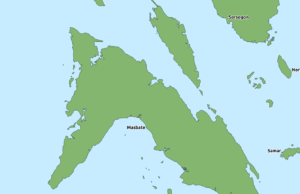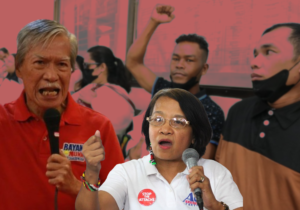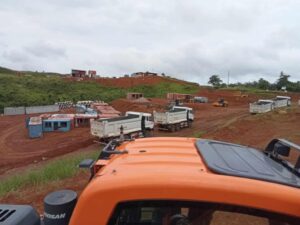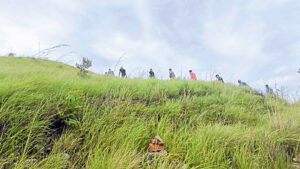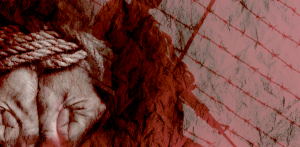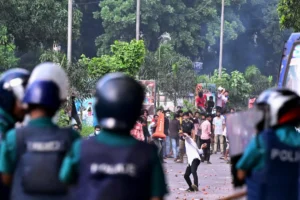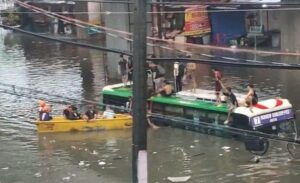Apex Mining's devastating operations continue despite tragedy

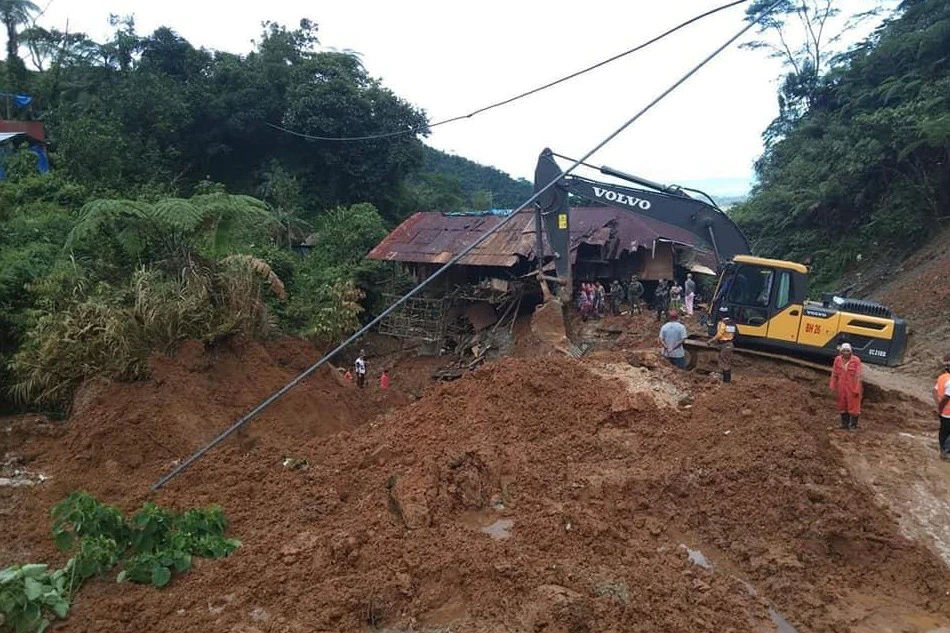
The mining operations of Enrique Razon’s Apex Mining Corporation Inc. continue uninterrupted, despite the landslide on February 6 in its area in Barangay Masara, Maco, Davao de Oro.
According to the latest news, the bodies of 68 company workers were dug up from the landslide, while more than 51 remain missing. In addition to the bus terminal and the barangay hall, there are 55 to 60 houses buried. The local government has not yet released any numbers. About 1,637 families or 6,356 individuals are affected by the disaster from four barangays (Elizalde, Mainit, Masara and Tagbaros) of Maco. They are now stuck in 13 evacuation centers in Maco and Mawab.
The Apex company admitted on February 12 that its operations are at 50% to 80% capacity since February 7. This contradicts the company’s initial statement that operations were “limited” to “focus manpower” on “supporting” the efforts to rescue buried workers.
It also made a big show of donating a measly ₱300,000 worth of one-time relief items to its employees and their families. The company made ₱2.306 billion in net income in the first nine months of 2023 alone. (Meanwhile, the DSWD reported that it has already distributed ₱2,296,835.00 worth of relief and aid from February 7 to February 12.)
Until now, Apex has made no official confirmation of the count or the names of its buried workers, despite journalists’ questions since the rescue operations began. Its officials kept avoiding its links with other victims.
A radio station reported that Apex immediately paid off the victim’s families, along with local barangay officials, to silence them and suppress their demand for justice. Apex’s excuse is that their operation does not cover the area because it is one kilometer away from an “active mine.” However, the company-owned bus terminal is only 500 meters away from the company gate.
Despite clear evidence of the mining’s destruction of the natural terrain and its role in deforestation, the Mines and Geosciences Bureau immediately defended Apex-XI and said Apex’s mining had “nothing to do” with the landslide. According to the agency, the erosion is due to the “type of soil, rainfall and the nature of the slope.”
The local government even blamed the victims for the tragedy for supposedly building their houses in the declared “no build zone.” Ironically, the barangay hall and the Apex bus terminal are also located in this area. According to news reports, Apex workers and their families use the houses in Ward 1 as “transient housing.”
Davao de Oro (formerly Compostela Valley), and Masara itself, have a long history of landslides after heavy and prolonged rains. In August 2007, 10 people died after a landslide in another part of the barangay. In September 2008, two landslides occurred in the exact same area of the current landslide in Masara, killing 24, injuring 31, and forcibly displacing 279 families. These destroyed the same barangay hall and buried 83 houses. That time, Apex also argued that the landslides were “out of their area of operation” because it was three kilometers away from their “active mine.”
History of destruction and plunder
Apex has been mining in Maco since 1976. It started as a small-scale mining company until 1989. Since then, it has been notorious for low wages and unsafe working conditions. In 2000, it completely suspended operations. It returned as large-scale mining under the supervision of foreign companies Goldridge Mining Corporation (a US company), Viclode Mining Corporation, and Mintricor Inc. in 2003. Crew Gold (then a Canadian company) bought the company in 2009, which in turn sold to ASVI (Malaysia) in 2009. In 2013, it was bought by Razon’s Monte Oro and his comprador partners.
The area currently mined by Apex has been under various Mining/Lode Lease Contracts since 1994. In 2005, the company was granted MPSA-225-2005-XI covering 679.02 hectares in the adjacent villages of Masara and Teresa. The mine’s scope was expanded when it was awarded MPSA-234-2007-XI in 2007.
It was given 1,558.53 hectares in the adjacent barangays of Masara, Mainit, Tagbaros, New Leyte, Elizalde and New Barili in Maco and some parts of the adjacent town of Mabini. Both MPSAs are valid for 25 years, each can be extended for an additional 25 years. This means that the company has the right to excavate and extract gold until 2030 and 2032. The two MPSAs will extract an estimated 1,250,000 ounces of gold within its scope.
In exchange for plundering natural resources, the company pays only up to 4% excise tax to the reactionary state. A measly 1% to the local government and the tribes. These areas are part of the ancestral land of the Mansakas.
On April 10, 2014, Red fighters under the NPA-SMR attacked Apex to punish it for the wide-ranging destruction it wrought on Lumad communities and the environment. Apex’s destructive operations then included the continued expansion of its underground and open-pit mining in the area, despite the revolutionary movement’s repeated warnings against it.
It also expanded operations and land excavation in the remaining forest in Maco, which was declared protected by the revolutionary people in the area. Apex’s other accountabilities include 1) failure to compensate victims of two landslides in 2007 and 2008, 2) low wages and arbitrary worker lay-offs, 3) failure to rehabilitate rivers and bridges in Maco which it promised to Maco residents, and 4) actively funding the combat operations of the 9th IB then deployed in the province.
The NPA clearly stated then that the landslides in Maco in consecutive years were caused by Apex’s widespread destruction of forests and land, which earlier caused the dislocation of entire communities of Lumads and farmers since the 1970s.

